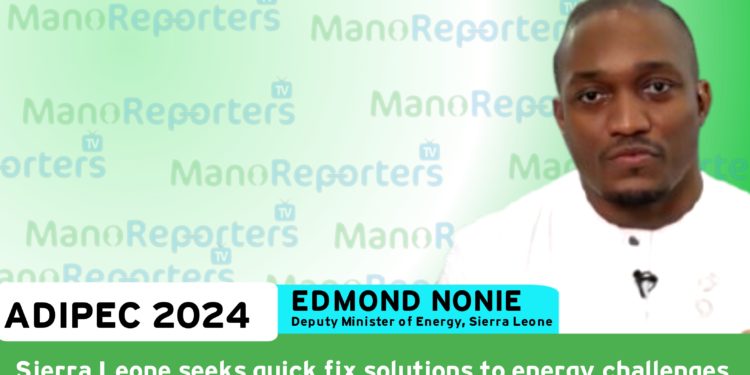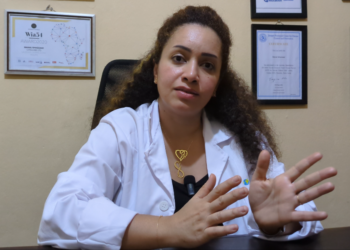By Kemo Cham
Sierra Leone’s Deputy Minister of Energy, Edmond Nonie, has said that while working towards a permanent solution for the country’s energy needs, his government is also searching for quick fixes to deal with pressing challenges facing the sector.
Mr Nonie is currently in Abu Dhabi, the United Arab Emirates, where he is attending the 2024 edition of the Abu Dhabi International Petroleum Exhibition and Conference (ADIPEC).
ADIPEC is thought to be the world’s largest energy forum and one of the most influential events for oil, gas and energy professionals. It provides a platform for experts in energy and potential investors to discuss, showcase, and collaborate on the latest developments in the sector.
ADIPEC 2024 is convened under the theme: ‘Decarbonising. Faster. Together.’
Deputy Minister Nonie, an engineer and technology innovator, is one of over 1,600 speakers at the four-day event that runs from November 4th to 7th at the Abu Dhabi National Exhibition Centre. He made a scheduled presentation on the session ‘Increasing collaboration between the Global North and South for a successful transition.
Nonie told ManoReporters that an immediate concern for the Bio Administration is to fix the current problem of load shedding in the country’s capital, Freetown. And he believes that to realized this, there is a need for additional partners to generate more electricity.
The Kingtom Power station, which is located in the center of Freetown, supplies the city of a population of over one million people, with the aid of three other substations. But because of ageing infrastructure and other limitations at the Kingtom station, there is frequent shutdown of the system.
The plan of the government, according to Nonie, is to enable the other three power stations to inject electricity directly to the communities they serve.
“At ADIPEC we are talking to partners, we are talking to developers, who can install capacity in the other three power houses, so (that) once we have electricity injection happening in four locations across the city, it is going to be decentralized, it’s going to be distributed, it’s going to be much closer to the communities that the electricity is going to serve,” he said.
“It also means that if one location has an issue, the other three locations are still operating and can still provide electricity,” he added.
ADIPEC this year celebrates its 40th anniversary.
This event was billed to attract over 16, 000 industry professionals from across the globe.
Sierra Leone’s participation is crucial given the government’s prioritization of energy as part of its “Big 5 Game Changers” development agenda. Under this blue print, energy is regarded as a critical enabler of progress in the areas of infrastructure, healthcare, education, agriculture, and economic growth.
At the heart of it is the goal of transitioning to sustainable renewable energy solutions, with the aim of increasing its renewable energy mix from 30-35 per cent to 60 per cent by 2030.
The Abu Dhabi conference coincided with the convening of the second edition of the National Dialogue on Climate Resilience and Energy Transition in Freetown.
The government plans to achieve these key initiatives through the construction of solar mini-grids and expanding rural electrification.
Nonie said to succeed in all these, the country must overcome infrastructure challenges, which is only possible with the involvement of the private sector.
He said his message to his audience in Abu Dhabi was to see the challenges in Sierra Leone’s energy sector as investment opportunity, assuring that his government is ready to make that investment process as seamless and as supportive as possible.
“Sierra Leone is early in its energy journey, and this actually represents an opportunity and not just a challenge. So what we are saying to people is come to the country, let’s look at the energy challenge in Sierra Leone not as a humanitarian issue only, but also as a commercial opportunity for energy investors,” he said.






















